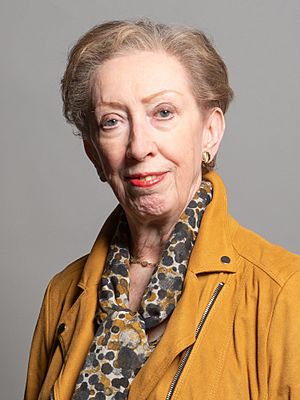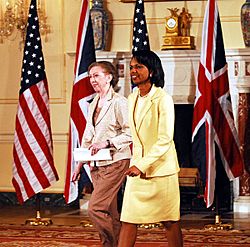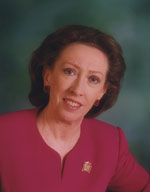Margaret Beckett facts for kids
Quick facts for kids
The Baroness Beckett
|
|||||||||||||||||||||||||
|---|---|---|---|---|---|---|---|---|---|---|---|---|---|---|---|---|---|---|---|---|---|---|---|---|---|

Official portrait, 2020
|
|||||||||||||||||||||||||
| Foreign Secretary | |||||||||||||||||||||||||
| In office 5 May 2006 – 27 June 2007 |
|||||||||||||||||||||||||
| Prime Minister | Tony Blair | ||||||||||||||||||||||||
| Preceded by | Jack Straw | ||||||||||||||||||||||||
| Succeeded by | David Miliband | ||||||||||||||||||||||||
| Secretary of State for Environment, Food and Rural Affairs | |||||||||||||||||||||||||
| In office 8 June 2001 – 5 May 2006 |
|||||||||||||||||||||||||
| Prime Minister | Tony Blair | ||||||||||||||||||||||||
| Preceded by | Nick Brown John Prescott |
||||||||||||||||||||||||
| Succeeded by | David Miliband | ||||||||||||||||||||||||
| Minister of Agriculture, Fisheries and Food | |||||||||||||||||||||||||
| In office 8 June 2001 – 27 March 2002 |
|||||||||||||||||||||||||
| Prime Minister | Tony Blair | ||||||||||||||||||||||||
| Preceded by | Nick Brown | ||||||||||||||||||||||||
| Succeeded by | Herself | ||||||||||||||||||||||||
| Leader of the House of Commons Lord President of the Council |
|||||||||||||||||||||||||
| In office 27 July 1998 – 8 June 2001 |
|||||||||||||||||||||||||
| Prime Minister | Tony Blair | ||||||||||||||||||||||||
| Preceded by | Ann Taylor | ||||||||||||||||||||||||
| Succeeded by | Robin Cook | ||||||||||||||||||||||||
| Secretary of State for Trade and Industry President of the Board of Trade |
|||||||||||||||||||||||||
| In office 2 May 1997 – 27 July 1998 |
|||||||||||||||||||||||||
| Prime Minister | Tony Blair | ||||||||||||||||||||||||
| Preceded by | Ian Lang | ||||||||||||||||||||||||
| Succeeded by | Peter Mandelson | ||||||||||||||||||||||||
| Leader of the Opposition | |||||||||||||||||||||||||
| In office 12 May 1994 – 21 July 1994 |
|||||||||||||||||||||||||
| Monarch | Elizabeth II | ||||||||||||||||||||||||
| Prime Minister | John Major | ||||||||||||||||||||||||
| Preceded by | John Smith | ||||||||||||||||||||||||
| Succeeded by | Tony Blair | ||||||||||||||||||||||||
| Deputy Leader of the Labour Party | |||||||||||||||||||||||||
| In office 18 July 1992 – 21 July 1994 |
|||||||||||||||||||||||||
| Leader | John Smith | ||||||||||||||||||||||||
| Preceded by | Roy Hattersley | ||||||||||||||||||||||||
| Succeeded by | John Prescott | ||||||||||||||||||||||||
|
|||||||||||||||||||||||||
|
|||||||||||||||||||||||||
| Member of the House of Lords Lord Temporal |
|||||||||||||||||||||||||
| Assumed office 14 August 2024 Life peerage |
|||||||||||||||||||||||||
| Member of Parliament for Derby South |
|||||||||||||||||||||||||
| In office 9 June 1983 – 30 May 2024 |
|||||||||||||||||||||||||
| Preceded by | Walter Johnson | ||||||||||||||||||||||||
| Succeeded by | Baggy Shanker | ||||||||||||||||||||||||
| Member of Parliament for Lincoln |
|||||||||||||||||||||||||
| In office 10 October 1974 – 7 April 1979 |
|||||||||||||||||||||||||
| Preceded by | Dick Taverne | ||||||||||||||||||||||||
| Succeeded by | Kenneth Carlisle | ||||||||||||||||||||||||
| Personal details | |||||||||||||||||||||||||
| Born |
Margaret Mary Jackson
15 January 1943 Ashton-under-Lyne, Lancashire, England |
||||||||||||||||||||||||
| Political party | Labour | ||||||||||||||||||||||||
| Spouse |
Lionel Beckett
(m. 1979; died 2021) |
||||||||||||||||||||||||
| Alma mater | Manchester College of Science and Technology (BSc) | ||||||||||||||||||||||||
| Signature | |||||||||||||||||||||||||
Margaret Mary Beckett, Baroness Beckett (born 15 January 1943), is a British politician. She was a Member of Parliament (MP) for over 45 years. She served first from 1974 to 1979 and then from 1983 to 2024.
As a member of the Labour Party, she made history. She was the United Kingdom's first female Foreign Secretary. She also served as a minister under several Prime Ministers. These included Harold Wilson, James Callaghan, Tony Blair, and Gordon Brown.
Margaret Beckett was the Deputy Leader of the Labour Party from 1992 to 1994. She also briefly became Leader of the Opposition. This happened after John Smith's death in 1994. She represented Lincoln as an MP from 1974 to 1979. Later, she represented Derby South from 1983 to 2024. Her long service in the House of Commons makes her one of the longest-serving female MPs.
Contents
Early Life and Education
Margaret Mary Jackson was born in 1943 in Ashton-under-Lyne, England. Her father was a carpenter, and her mother was a teacher. Her family faced financial challenges when her father passed away early.
She attended Notre Dame High School for Girls in Norwich. Later, she studied at the University of Manchester Institute of Science and Technology. There, she earned a degree in metallurgy, which is the study of metals. She was also very active in her university's Students' Union.
In 1961, Margaret started as a student apprentice at Associated Electrical Industries. She joined the Transport and General Workers Union in 1964. In 1966, she worked at the University of Manchester in the metallurgy department. By 1970, she began working for the Labour Party as a researcher.
Becoming a Member of Parliament
In 1973, Margaret Beckett was chosen to be the Labour candidate for Lincoln. She aimed to win back the seat from a former Labour MP, Dick Taverne. In the February 1974 election, she narrowly lost to Taverne.
After this, she worked as a researcher for Judith Hart, a minister in the government. In the October 1974 general election, Margaret ran again in Lincoln. This time, she won and became an MP.
Soon after her election, she became a Whip in 1975. In 1976, she was promoted to a junior minister role. She worked at the Department of Education and Science. She held this position until she lost her seat in the 1979 general election.
After losing her seat, she worked as a researcher for Granada Television. In 1980, she was elected to Labour's National Executive Committee. In 1983, she was selected to run for the Derby South constituency. She won this seat and returned to Parliament. In March 2022, she announced she would step down as an MP at the next general election. She officially left the House of Commons in May 2024.
Shadow Cabinet and Deputy Leader
After returning to the House of Commons in 1983, Margaret Beckett became a key figure. She was appointed to the shadow cabinet in 1989. The shadow cabinet is a group of opposition MPs who "shadow" government ministers.
In 1992, she was elected Deputy Leader of the Labour Party. This made her the first woman to hold this important role. She worked alongside John Smith, who was the Labour Party leader. She also became a member of the Privy Council in 1993. This is a group of senior advisors to the monarch.
When John Smith sadly passed away in May 1994, Margaret Beckett became the Acting Leader of the Labour Party. She was the first woman to lead the Labour Party, even if it was for a short time. She ran for the full leadership but came in third place. Tony Blair won the election and became the new leader. She was then appointed Shadow Health Secretary.
Serving in Government
When the Labour Party won the 1997 general election by a large margin, Margaret Beckett took on several senior roles. She became the President of the Board of Trade, which was a very important position. She was the first woman to hold this job.
From 1998 to 2001, she served as Leader of the House of Commons. In this role, she helped make Parliament more modern. She introduced "Westminster Hall debates," which allowed MPs to discuss more topics.
Secretary of State for Environment, Food and Rural Affairs
After the 2001 general election, Margaret Beckett became the Secretary of State for the new Department for the Environment, Food and Rural Affairs (DEFRA). This department was created to better manage issues related to the environment, food, and farming.
She was responsible for tackling important issues like climate change. She attended international meetings to discuss how to protect our planet. She held this position until May 2006.
Foreign Secretary
In 2006, Margaret Beckett was appointed Foreign Secretary. This was a big surprise, even for her! She became the first woman to hold this very important job. The Foreign Secretary is in charge of the UK's relationships with other countries.
This role is one of the "Great Offices of State," which are the most senior positions in the government. She was only the second woman, after Margaret Thatcher, to hold such a high office. She quickly had to deal with major international issues, like the situation in Iran.

After Government Roles
When Gordon Brown became Prime Minister in 2007, Margaret Beckett left her role as Foreign Secretary. She returned to being a regular MP, known as a "backbencher."
In 2008, she returned to government as the Minister of State for Housing. She attended Cabinet meetings, using her experience to help with housing issues. She left government for the last time in 2009.
After the Labour Party lost power in 2010, she continued to serve as an MP. She stepped down from Parliament at the 2024 general election. Soon after, in August 2024, she was appointed to the House of Lords. This means she became a "Baroness" and continues to contribute to Parliament.
Expenses and Speaker Bid
In 2009, there was a public discussion about MPs' expenses. Margaret Beckett's expenses were reviewed. She also decided to run to become the Speaker of the House of Commons in 2009. The Speaker is like the referee in Parliament. She wanted to help Parliament deal with its challenges. She received a good number of votes but did not win the election.
Electoral System Campaign
In 2010, Margaret Beckett became the President of the NOtoAV campaign. This campaign wanted to keep the current voting system in the UK, called First Past the Post. She successfully led this campaign, and the system remained unchanged.
Labour Party Leadership Election
In 2015, Margaret Beckett nominated Jeremy Corbyn as a candidate for the Labour Party leadership election. She later supported Owen Smith in a different leadership contest in 2016. In 2019, she said she was "surprised" by how much Corbyn had grown into his role as leader of the opposition.
Beckett Report
In 2016, Margaret Beckett released a report called "Learning the Lessons from Defeat Taskforce Report." This report looked into why the Labour Party lost the 2015 general election. The report suggested that reasons for the loss included the public's view of Ed Miliband as leader and concerns about Labour's relationship with the Scottish National Party. It also mentioned "issues of connection" with voters. The report aimed to help the Labour Party understand its challenges and plan for the future.
Honours and Personal Life
Margaret Beckett was made a member of the Privy Council in 1993. She has also received high honours for her public service. She was appointed Dame Commander of the Order of the British Empire (DBE) in 2013. In 2024, she was promoted to Dame Grand Cross of the Order of the British Empire (GBE).
In 2017, she received an honorary degree from the University of Derby. After stepping down as an MP in 2024, she was made a life peer. This means she became Baroness Beckett and can sit in the House of Lords.
Margaret Beckett married Lionel "Leo" Beckett in 1979. Leo Beckett had two sons from a previous marriage. Leo Beckett passed away in 2021.
See also
 In Spanish: Margaret Beckett para niños
In Spanish: Margaret Beckett para niños
 | Kyle Baker |
 | Joseph Yoakum |
 | Laura Wheeler Waring |
 | Henry Ossawa Tanner |


